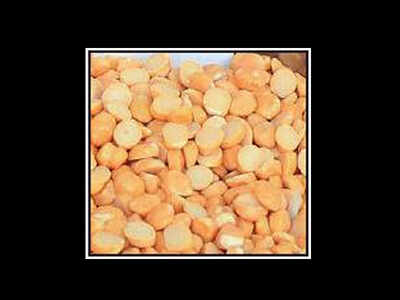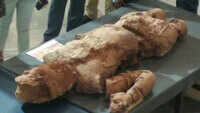
HYDERABAD: Chana dal has been an essential ingredient in Indian cuisine, particularly the famous Hyderabadi dalcha and Andhra mirchi bhajji.
Now, an international team of researchers led by scientists from Hyderabad have decoded the genetic secrets behind this important legume. They also traced the origin of chana dal or chickpea to the Mediterranean and its entry into India via Afghanistan.
The researchers successfully sequenced 429 chickpea lines from 45 countries to identify genes for tolerance to drought and heat. The efforts equipped the team with key insights into the crop’s genetic diversity, domestication and agronomic traits. The study also mapped the origins of chickpea and its ascent in Asia and Africa, said an official statement from ICRISAT.
The research was led by ICRISAT in close collaboration with the BGI-Shenzhen, China. The mega exercise involved 39 scientists from leading research institutes from across the world. This is the largest-ever exercise of whole-genome resequencing of chickpea. “What this means to the agricultural community is potential development of newer varieties of chickpea with higher yields, which are disease-and-pest-resistant, and better able to withstand the vagaries of weather,” ICRISAT said. The outcome of the study that lasted for three years was published in Nature Genetics online on Tuesday.
Stating that more than 90% of chickpea cultivation area is in South Asia, ICRISAT said drought and increasing temperatures are said to cause more than 70% yield loss in chickpea globally. Chickpea being a cool season crop is likely to suffer further reduction in productivity due to rising temperatures. “The genome-wide association studies identified several candidate genes for 13 agronomic traits. We could identify genes which can help the crop tolerate temperatures up to 38 degrees Celsius and provide higher productivity,” said Dr Rajeev Varshney, project leader and research programme director, Genetic Gains, ICRISAT.
The study established a foundation for large-scale characterisation of germplasm, population genetics and crop breeding. It also helped understand domestication and post-domestication divergence of chickpea. “This new-found knowledge will enable breeders to enhance the use of diverse germplasm and candidate genes in developing improved (climate-change ready) varieties that will contribute significantly to the increased productivity and sustainability of agricultural development in developing countries,” said Dr Peter Carberry, director-general, ICRISAT.
Now, an international team of researchers led by scientists from Hyderabad have decoded the genetic secrets behind this important legume. They also traced the origin of chana dal or chickpea to the Mediterranean and its entry into India via Afghanistan.
Scientists from the city-based International Crops Research Institute for Semi-Arid Tropics (ICRISAT) and Osmania University (OU) were part of the research team drawn from 21 scientific institutions around the world that studied the genetic makeup of chickpea and traced the genes that could help farmers grow chickpea under drought conditions too. The research gains significance as it will help in development of climate-resilient chickpea.
The researchers successfully sequenced 429 chickpea lines from 45 countries to identify genes for tolerance to drought and heat. The efforts equipped the team with key insights into the crop’s genetic diversity, domestication and agronomic traits. The study also mapped the origins of chickpea and its ascent in Asia and Africa, said an official statement from ICRISAT.
The research was led by ICRISAT in close collaboration with the BGI-Shenzhen, China. The mega exercise involved 39 scientists from leading research institutes from across the world. This is the largest-ever exercise of whole-genome resequencing of chickpea. “What this means to the agricultural community is potential development of newer varieties of chickpea with higher yields, which are disease-and-pest-resistant, and better able to withstand the vagaries of weather,” ICRISAT said. The outcome of the study that lasted for three years was published in Nature Genetics online on Tuesday.
Stating that more than 90% of chickpea cultivation area is in South Asia, ICRISAT said drought and increasing temperatures are said to cause more than 70% yield loss in chickpea globally. Chickpea being a cool season crop is likely to suffer further reduction in productivity due to rising temperatures. “The genome-wide association studies identified several candidate genes for 13 agronomic traits. We could identify genes which can help the crop tolerate temperatures up to 38 degrees Celsius and provide higher productivity,” said Dr Rajeev Varshney, project leader and research programme director, Genetic Gains, ICRISAT.
The study established a foundation for large-scale characterisation of germplasm, population genetics and crop breeding. It also helped understand domestication and post-domestication divergence of chickpea. “This new-found knowledge will enable breeders to enhance the use of diverse germplasm and candidate genes in developing improved (climate-change ready) varieties that will contribute significantly to the increased productivity and sustainability of agricultural development in developing countries,” said Dr Peter Carberry, director-general, ICRISAT.
#ElectionsWithTimes
more from times of india cities
Elections 2019

Trending Topics
LATEST VIDEOS
More from TOI
Navbharat Times
Featured Today in Travel
Quick Links
Lok Sabha Election Schedule 2019Lok Sabha Election NewsDelhi Capitals teamMI team 2019Rajasthan Royals 2019RCB team 2019Maharashtra Lok Sabha ConstituenciesBJP Candidate ListBJP List 2019 TamilnaduShiv Sena List 2019AP BJP List 2019Mamata BanerjeeBJP List 2019 MaharashtraPriyanka GandhiBJP List 2019 KarnatakaAMMK Candidate List 2019BJP List 2019 WBLok Sabha Elections in Tamil NaduBSP List 2019 UPNews in TamilLok Sabha Poll 2019Satta Matka 2018PM ModiMahagathbandhanNagpur BJP Candidate ListChandrababu NaiduTamil Nadu ElectionsUrmila MatondkarNews in TeluguMadras High CourtTejashwi YadavArvind KejriwalTejasvi SuryaPawan KalyanArvind KejriwalYogi AdityanathJaya PradaSatta King 2019Srinagar encounter
Get the app










